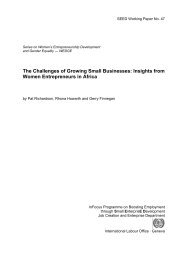manual: women workers' rights and gender equality - International ...
manual: women workers' rights and gender equality - International ...
manual: women workers' rights and gender equality - International ...
Create successful ePaper yourself
Turn your PDF publications into a flip-book with our unique Google optimized e-Paper software.
Briefing Note 2 Gender Equality 16<br />
What is Gender Equality <strong>and</strong> why is it important for a better quality of life?<br />
• Equality between <strong>women</strong> <strong>and</strong> men, or <strong>gender</strong> <strong>equality</strong> refers to the equal <strong>rights</strong>,<br />
responsibilities <strong>and</strong> opportunities of men <strong>and</strong> <strong>women</strong>, girls <strong>and</strong> boys. Gender <strong>equality</strong> is not a<br />
“<strong>women</strong>’s issue”, it concerns men as well.<br />
• Equality in <strong>rights</strong> means that <strong>women</strong> <strong>and</strong> men have the same <strong>rights</strong> as human beings <strong>and</strong><br />
workers: All people have a right to fulfil their basic needs, to be treated with respect, not to be<br />
exposed to violence in whatever form <strong>and</strong> to be given chances to development.<br />
• Equality in responsibilities <strong>and</strong> opportunities does not mean that <strong>women</strong> <strong>and</strong> men need to<br />
become the same, but that the division of labour <strong>and</strong> distribution of resources, benefits <strong>and</strong><br />
decision making power is fair <strong>and</strong> just, i.e. <strong>women</strong>’s <strong>and</strong> men’s responsibilities <strong>and</strong><br />
opportunities will not depend on whether they are born male or female. Example of in<strong>equality</strong>:<br />
if two persons are equally hungry, giving one enough food to still the hunger <strong>and</strong> the other only<br />
half of the portion.<br />
• Lessons from experience indicate that <strong>women</strong> <strong>and</strong> men both contribute to:<br />
- Economic growth<br />
- Human development<br />
• However, worldwide the experience is that there are inequalities:<br />
- Women share a major proportion of work but their work is invisible <strong>and</strong> less rewarded<br />
- Women’s workload is larger<br />
- Women have less access to education <strong>and</strong> training<br />
- Women are under-represented in leadership <strong>and</strong> management<br />
• As a result <strong>women</strong>’s views, interests <strong>and</strong> needs are often not met<br />
• Investment in both men <strong>and</strong> <strong>women</strong> is crucial for sustainable socio-economic development. It<br />
gives high returns in:<br />
- Families<br />
- Whole society<br />
• Equality between <strong>women</strong> <strong>and</strong> men is both a human <strong>rights</strong> issue <strong>and</strong> a precondition for<br />
sustainable people-centred, social <strong>and</strong> economic development. Thus, promotion of <strong>gender</strong><br />
<strong>equality</strong> is not only the right thing to do but also the smart thing to do, because it leads to a<br />
better quality of life for everybody. As work takes place everywhere, the ILO promotes <strong>gender</strong><br />
<strong>equality</strong> at work, in the community <strong>and</strong> in the house<br />
16 Report of Workshop on Participation of Indigenous Men <strong>and</strong> Women in Development (11-13 December 2000,<br />
Chiangmai, Thail<strong>and</strong>), Nelien Haspels, ILO/EASMAT, 2001.<br />
139

















